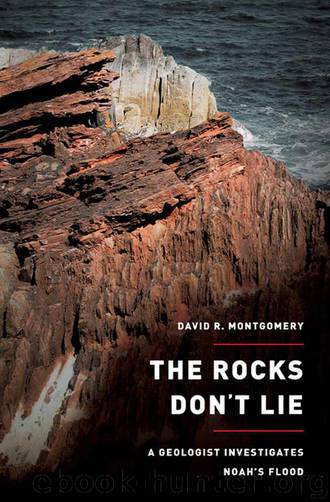The Rocks Don't Lie: A Geologist Investigates Noah's Flood by David R. Montgomery

Author:David R. Montgomery [Montgomery, David R.]
Language: eng
Format: epub, azw3, mobi
Tags: General, Science, Non-Fiction, 21st Century, v.5, Amazon.com, Retail, Philosophy & Social Aspects, Religion, Fiction, Nature, Religion & Science, Hydrology, Geology, Earth Sciences, Natural Disasters, Religious Studies
ISBN: 9780393082395
Amazon: 0393082393
Barnesnoble: 0393082393
Publisher: W. W. Norton & Company
Published: 2012-08-27T00:00:00+00:00
9
Recycled Tales
CENTURIES BEFORE GEORGE SMITH discovered that the opening chapters of the Bible were reworked Babylonian tales, controversy over the authorship of the Bible centered on how to interpret it as the literal word of God. The original Hebrew version had no vowels, leaving room for interpretation as to the specific wording when the Bible was translated into Greek. In 1538, the Jewish scholar Elijah ben Asher Levita demonstrated that the accents and points indicating where to insert vowels, add punctuation, and divide Hebrew words were invented by rabbis long after the translation of the Jewish Bible. Before the adoption of modern written Hebrew, the Jewish Bible consisted of a string of consonants. Meanings could vary depending upon how one inserted the missing vowels and where one divided words. Biblical translators like Saint Jerome had to use their judgment, which could introduce varying shades of meaning and complicate literal interpretations. Concern over potential human influence and errors came to a head in 1650, when Louis Cappel, a French Calvinist professor of biblical studies, painstakingly compared biblical translations in his massive Critica Sacra (Sacred Criticism) to demonstrate that the Bible was a book with a history, rather than the word of God delivered directly from the source.
Even before the Renaissance, it was well known that there were striking differences between the Greek and Hebrew Bibles. Arguments over which Bible was the true word of God led some scholars to argue that the Hebrew text was corrupt, or had even been intentionally altered to deceive Christians. Others argued that the Greek Bible was a hodgepodge of inferior translations, or that the Latin Bible was full of errors. This presented Christians with the awkward challenge of which version to believe.
Grappling with this controversy, Martin Luther emphatically labeled the Latin Bible a flawed text and devoted himself to sorting through the different wordings of the Greek and Hebrew texts. His efforts led him to dismiss the books of James and Jude as true scripture and relegate them to the end of his Bible. About the Book of Revelation, he wrote that every man could make up his own mind, but he “cannot find that it was inspired by the Holy Spirit.”1 In his view, the Latin Bible was so filled with errors that to confidently discern the meaning of scripture, one had to go back and read the original texts. Even Luther acknowledged that scriptural interpretation required care to avoid potentially flawed plain-sense understanding.
When the sixteenth-century Council of Trent met to judge Protestant heresies and clarify church teachings, the assembled bishops were deeply concerned that if they upheld Luther’s critique the Latin Bible would lose all authority. The more they debated, the more authoritative Jerome’s Latin translation became. The council finally declared the Latin Bible superior to the Greek and Hebrew versions, a conclusion they considered to be inspired by God. The bishops disagreed with Luther’s claim that ordinary men could interpret the plain words of scripture for themselves. Fearing that freedom
Download
The Rocks Don't Lie: A Geologist Investigates Noah's Flood by David R. Montgomery.azw3
The Rocks Don't Lie: A Geologist Investigates Noah's Flood by David R. Montgomery.mobi
This site does not store any files on its server. We only index and link to content provided by other sites. Please contact the content providers to delete copyright contents if any and email us, we'll remove relevant links or contents immediately.
| Acoustics | Bridges |
| Earthwork Design | Environmental |
| Fire Science | Highway & Traffic |
| Hydrology | Remote Sensing |
| Seismic Design | Structural |
| Structural Dynamics | Surveying & Photogrammetry |
| Transportation |
Whiskies Galore by Ian Buxton(41995)
Introduction to Aircraft Design (Cambridge Aerospace Series) by John P. Fielding(33122)
Small Unmanned Fixed-wing Aircraft Design by Andrew J. Keane Andras Sobester James P. Scanlan & András Sóbester & James P. Scanlan(32796)
Craft Beer for the Homebrewer by Michael Agnew(18237)
Turbulence by E. J. Noyes(8040)
The Complete Stick Figure Physics Tutorials by Allen Sarah(7366)
The Thirst by Nesbo Jo(6932)
Kaplan MCAT General Chemistry Review by Kaplan(6929)
Bad Blood by John Carreyrou(6612)
Modelling of Convective Heat and Mass Transfer in Rotating Flows by Igor V. Shevchuk(6433)
Learning SQL by Alan Beaulieu(6282)
Weapons of Math Destruction by Cathy O'Neil(6267)
Man-made Catastrophes and Risk Information Concealment by Dmitry Chernov & Didier Sornette(6007)
Digital Minimalism by Cal Newport;(5750)
Life 3.0: Being Human in the Age of Artificial Intelligence by Tegmark Max(5549)
iGen by Jean M. Twenge(5409)
Secrets of Antigravity Propulsion: Tesla, UFOs, and Classified Aerospace Technology by Ph.D. Paul A. Laviolette(5369)
Design of Trajectory Optimization Approach for Space Maneuver Vehicle Skip Entry Problems by Runqi Chai & Al Savvaris & Antonios Tsourdos & Senchun Chai(5066)
Pale Blue Dot by Carl Sagan(4996)
